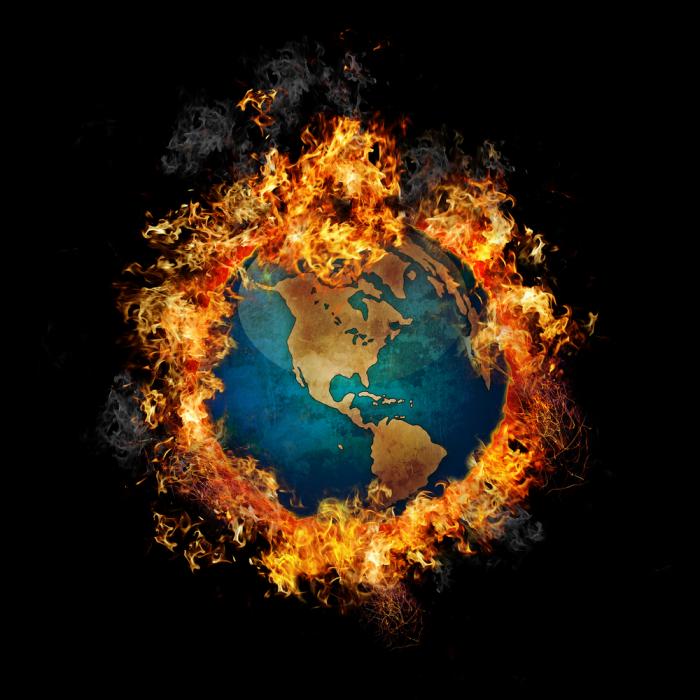- Home
- Play & Learn Home
- Online Enrichment
- Experience Modern Israel
- Israel It's Complicated
- Jewish and Me
- Jewish Holidays Jewish Values
- Jewish Values in Genesis and Jewish Values in Exodus
- Min Ha’aretz
- Our Place in the Universe
- Simply Seder
- The Prophets: Speaking Out for Justice
- Making T'filah Meaningful
- Make, Create, Celebrate
- Yom Haatzmaut Resources
- Hebrew Apps
- About The OLC
- What is the OLC?
- Introduction
- Get Started
- Resources
- OLC Content
- Parent Materials
- See My OLC Classes
- Store
Global Warming Debate Sizzles
From BabagaNewz Magazine, Tishrei 5768 / September 2007
On July 7, 2007, Kelly Clarkson, Black Eyed Peas, and dozens of other musicians performed at "Live Earth" concerts worldwide. These concerts raised awareness about global warming, which, according to most scientists, could cause droughts, flooding, and severe storms. Although experts have agreed on probable effects of global warming, decisions about public policies to combat it stir debate. Sir Nicholas Stern, former chief economist at the World Bank, warns that failure to invest money now might cause "major disruption to economic and social activity" in the future. Skeptics disagree: "Despite our intuition that we need to do something drastic," says Danish statistician Bjorn Lomborg, "we are in danger of implementing a cure that is more costly than the original affliction."
GLOBAL WARMING PRIMER
Scientists agree that rising temperatures are caused by human activity; for example, burning fossil fuels to power automobiles. When fossil fuels burn, they release carbon dioxide (CO2) into the atmosphere. Carbon dioxide acts like a greenhouse, trapping heat that radiates from earth. Experts estimate that if the greenhouse effect continues, average temperatures could rise between 2° and 11° F by 2100.
RESPONSES TO GLOBAL WARMING
Two choices dominate public policy discussions: mitigate (reduce) CO2 emissions, or adapt to environmental consequences. Though governments pursue both options, they usually favor one and devote more resources to it. To choose the best solution, officials analyze global warming scenarios. For each, they ask, "If temperatures rise this amount, what will it cost to protect society? What will be the consequences if we do nothing?"
THE KYOTO PROTOCOL
In 1997, the international community chose to minimize carbon dioxide pollution. One hundred sixty countries signed an agreement in Kyoto, Japan, pledging to reduce their CO2 emissions. Tony Blair, former prime minister of the United Kingdom, justified their choice, saying, "The consequences of inaction would be disastrous." President Bush disagrees. He believes that innovations, like drought resistant crops or storm resistant buildings, will enable humans to adapt to climate change. If the government requires businesses to spend money curbing CO2 emissions, the president reasons, they will spend less developing products that help society adapt to global warming. Also, increasing operating costs to reduce greenhouse gases will lower profits, which will lower living standards. According to M.I.T. Professor Richard Lindzen, who supports the president's choice, "The reason we adjust to things far better than Bangladesh [a poor country in South Asia] is that we're richer."
THE JEWISH VIEW
Jewish law (halakhah) is silent about global warming. However, Jewish views on this subject can be learned by examining Torah values that have shaped not only Jewish environmental laws, but also those laws applicable when economic and environmental interests clash, as in the global warming debate. Judaism's approach to environmental issues begins by acknowledging that "the Earth and all that's in it belong to God" (Psalms 24:1). This recognition cultivates a reverence for God's creation and an awareness of our responsibility to protect it (Bereishit 2:15). This value is translated into law as bal tashh'it, the commandment prohibiting senseless destruction of nature (Devarim 20:19-20). Bal tashh'it, though, has limits. The Talmud describes cases where destroying nature was permitted because economic considerations took priority (Baba Kama 91b).
0
Activities for Students Online Article


